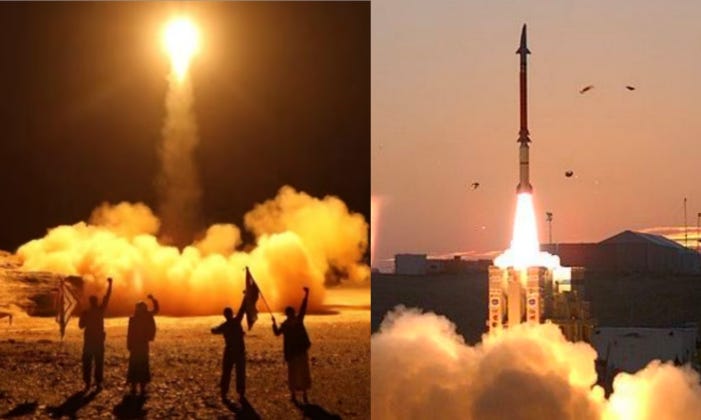Tables Turned: This Time Arabs Experiment Weapons on Israel
The resistance axis's message is clear: submit to a just peace or join the club of peoples feeling perpetually unsafe in their own lands.

For decades, Israeli weapons manufacturers like Elbit Systems have used the occupied Palestinian territories as a testing ground, experimenting with their deadly wares on innocent civilians before marketing the ‘battle-proven’ systems to unscrupulous regimes worldwide, from the European Union to Saudi Arabia. This dynamic has cemented Israel's military superiority in the Middle East, besides being equipped with a constant flow of state-of-the-art Western weaponry and the audacity to use it indiscriminately against the indigenous Palestinian population.
However, a recent ballistic missile strike from Yemen onto Israeli territory marks a seismic shift, suggesting the roles have reversed—for the first time, Arabs are testing new weapons on Israel rather than the other way around.
On Sunday, a Yemeni hypersonic ballistic missile penetrated Israel's vaunted aerial defenses, landing just kilometers from Ben Gurion Airport in central Tel Aviv. Remarkably, while taking great care to avoid civilian casualties - an aspect of warfare that distinguishes the Arab resistance from its Western adversaries - the missile's blistering pace of up to Mach 16 (around 20,000 km/hr) utterly exposed the vulnerability of Israel's multi-billion dollar defense systems. In a shocking revelation of the strike's severe psychological impact, a staggering 2.3 million Israelis—nearly a quarter of the country's population—frantically scrambled into shelters.
This strike was no lucky shot. It was part of the Ansar Allah (Houthi) resistance movement's "fifth phase" aimed at making Tel Aviv uninhabitable through systematic strikes. The Yemenis have sent an unequivocal message: their domestically-produced missiles can bypass Israel's defenses and sow panic at the heart of the Zionist regime.
Crucially, the missile - defiantly named "Palestine 2" in a deliberate move to humiliate Israeli aggressors - traversed over 2,000 kilometers, evading detection across several Arab states' airspaces and waterways where Israeli-allied defense systems are deployed. Yemen's ability to track and circumvent these systems underscores a startling advancement in Arab military capabilities.
Underscoring their desperation in the face of this sudden shift of balance of power, there are even reports that the helpless Biden regime approached Ansar Allah about striking a deal to recognize their government in Sanaa if the they stopped maritime attacks in the Red Sea. However, Ansar Allah officials state they outright rejected any such offer, a telling rebuff of American overtures from the soaring resistance front.
Unstoppable Yemenis
Far from a deterrent, Israel's retaliatory strikes on Yemen's lifeline Hodeidah port only solidified the resistance's resolve. The Yemenis remain undaunted, downing multiple expensive US drones worth over $300 million in the last week alone. The notion of deterrence is proving futile against a unified resistance front unwavering in its determination.
Compounding Israel's woes, Hezbollah's precise retaliatory strikes against Israeli military intelligence headquarters inflicted severe casualties, reportedly killing 20 senior officers and injuring 70 more. This blow has deeply rattled the Israeli leadership amidst a backdrop of internal upheaval—waves of resignations from senior security officials, widespread insubordination from ground forces, and growing dissent even among Israeli settlers in the north.
Meanwhile, Hamas' fighting capability in Gaza is being replenished faster than Israel can deplete it. Airstrikes have failed to degrade or defeat the resistance, which continues to demand an end to the genocidal aggression—a stance supported by Lebanon’s Hezbollah, Yemen's Ansar Allah, and Iran's Islamic Revolutionary Guard Corps.
Global Shift
The shifting fortunes are evident globally. Germany, responsible for 30% of Israeli weapons exports, has effectively imposed an arms embargo. Most Israeli requests for munitions like tank shells have gone unanswered, hampering prospects for a ground invasion of Lebanon—an ill-conceived plan Israel is paradoxically still contemplating despite its depleted resources and demoralized ranks.
Regionally too, the ground is shifting beneath Israel's feet. The Arab public is increasingly disillusioned with a toothless United Nations unable to halt Israeli atrocities in Gaza. The UN General Assembly's incremental moves to override the U.S. veto at the Security Council hints at the urge to maintain relevance and a growing international isolation of the Zionist regime.
Most significantly, a profound shift is underway within the "resistance axis" itself. Yemen, the farthest geographic member, has arguably become the front capable of striking deepest into Israel. Its audacious missile strikes are shattering two pillars of Israeli power—its military mythology and the notion of a secure Jewish homeland.
For Arabs across the region brutalized by decades of Israeli aggression, Yemen's strikes represent more than just a military capability; they are a reclamation of Arab dignity and a resounding rejection of the narrative of Israeli invincibility. The roles are finally reversing—Arabs are testing new weapons to confront an increasingly beleaguered and isolated Israeli war machine. The resistance axis's message is clear: submit to a just peace or join the club of peoples feeling perpetually unsafe in their own lands.
- Karim




This is good news! And I am moved to quote Wordsworth at such a time!
“Bliss was it in that dawn to be alive,
But to be young was very heaven!—Oh! times,
In which the meagre, stale, forbidding ways
Of custom, law, and statute, took at once
The attraction of a country in romance!”
It’s about time this criminal enterprise got a taste of its own medicine! The Houthis are the most renowned fighters in the world!
'...a toothless United Nations unable to halt Israeli atrocities in Gaza.'
Exactly, these global institutions are responsible for maintaining global order and security and dispensing justice. They're supposed to be fair and unbiased.
However, past and current geopolitical wars have exposed their weakness, downright inefficiency, and Western subservience. They've truly failed!
Good analysis, Karim.